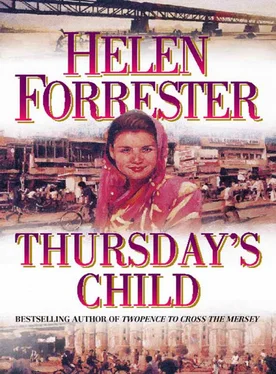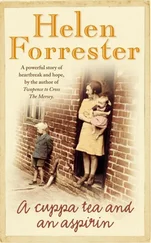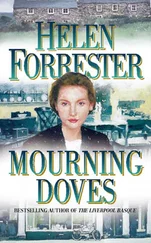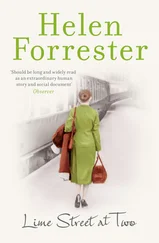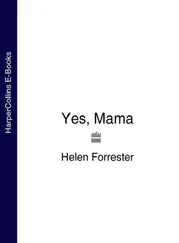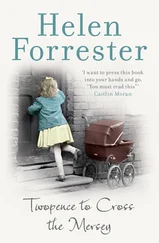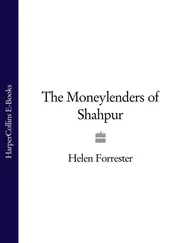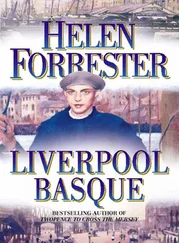My hands froze amongst the soapsuds of the washing-up water. Had she misunderstood Ajit’s and my relationship, and if she had, how could I explain its special quality?
‘I don’t know, Mummy,’ I said guardedly.
‘I think so, dear – Angela and Jamie.’
I sighed with relief. Mother knew nothing of James’s proposal to me; all she knew was that he used to pay equal attention to both her daughters, but recently he had taken Angela out alone on one or two occasions.
‘I hope you are right, Mother,’ I said, as I shook more soap flakes into the water.
Mother looked troubled.
‘I sometimes worry about Angela,’ she said. ‘I can never get close to her as I can to you – even when she was a small child she seemed remote and independent.’
‘Don’t worry, Mother. Angela is a very capable young woman and well able to take care of herself.’
Mother sighed.
‘I expect you are right, darling – it would be so nice if she married James – he’s so dependable.’
So Mother felt the same as I did about Angela. As far as her personal affairs were concerned, she was bafflingly unapproachable – and yet we both loved her. Whenever I thought of Angela I thought of kindness. We had shared our toys, lent each other clothes for special occasions, rarely quarrelled. When we were at Grammar School we had confided in each other about our boy friends and small triumphs and disappointments; but when I preceded her to University that closeness seemed to vanish, probably just because we saw less of each other.
What did I know of Angela, the grown-up, sophisticated Angela, who, now that the war was over, was beginning to publish modest papers on her work?
She was a shadowy figure who had rejoiced with me over my engagement to Jackie; held me tightly while I got over his death and had been glad when I became engaged to Barney – or had she been glad? She had seemed surprised, almost shocked at first.
As I carefully laid the plates on the draining-board for Mother to dry, I thought again of that terrible last year of the war and of the events that led up to my engagement to Barney.
The twins had lived down the road from us since they were small boys and we had often played together. Barney, James, Angela and me, and as we grew older we had occasionally paired off – my heart missed a beat – not Barney and Peggie, and James and Angela, but Barney and Angela, with James and me left to our own devices.
I dropped a cup and smashed it.
‘My love, I hope you are not upset about James and Angela,’ said Mother, helping me to pick up the bits.
‘Oh, no, Mummy,’ I said truthfully, ‘I am very pleased.’
I put the bits of broken china into the sink basket and apologised for my clumsiness.
Barney’s actual wooing of me, apart from odd kisses at children’s parties, had been short and sweet. It had been compressed into fourteen days’ leave during which we had become engaged, and one subsequent leave. In between there had been letters every two or three days – love letters.
I had been very flattered by the sudden special attention from a man who had stood high in my affection from childhood. His hot, almost desperate passion had awakened an equal passion in me, and the idea of spending the rest of my life with him made me glow with happiness.
Mechanically I emptied the teapot as I thought back to the days before Barney had volunteered for military service – and I was afraid. A fine sweat trickled down my back and I clutched the teapot firmly in case its fate should be the same as the broken teacup. I began to remember odd times when the four of us had gone out together, when we were all students – and I saw sudden little pictures of Barney hauling Angela up Scafell, Barney and Angela picking gooseberries in our garden and quarrelling at the same time, only to fall silent when I approached, Angela kissing someone good night under the laburnum – I had thought it was James she kissed, but it could have been Barney – Angela making a point of meeting the postman on her way out to work during the war and taking her letters from him.
I tried, as I scrubbed the kitchen sink, to remember Angela’s other men friends. There were one or two vague figures escorting her during her teens, but I realised with a growing feeling of nausea that, if I excepted a fellow scientist who had written a paper with her, I knew of no man with whom she had gone out alone either during or since the war, except Gaylord, an American officer, towards the end of the war.
I tried to crush down my fears. I did not really know who were her admirers – she could have been in love with the entire British Army – and we should not have known at home.
I was afraid to pursue the subject further and yet a morbid fascination led me on from one damning consideration to another. Try and be sensible, I told myself. He is dead anyway. Maybe he did admire Angela, loving her like a sister and you like a wife-to-be. But the kiss under the laburnum tree was not a sisterly kiss, said my memory.
I dried my hands. ‘Mother, I think I will lie down for a while before going to work.’
I felt like lying down to die, like the laddie in the Scottish song.
The winter twilight had already closed in, as I lay down on my bed. Why had I never thought of this before? Probably because I had never thought of being in competition with Angela. I was nearer the age of the twin brothers, being three years older than she was – and I had always imagined that her sweethearts would be younger men. Three years’ difference in age is nothing between adults – but it is between children, and I was still carrying on the same childish attitude that I had when she was four and I was seven. She had always been my little sister – too young to really feel what I was feeling. Too young to suffer what I was suffering.
Too young to suffer what I was suffering? My heart leaped with pity for Angela. If she and Barney had been sweethearts, what must she have suffered when he was killed? I remembered her tears on the day the news came and I mentally kicked myself for being so stupid. What must she have felt when he became engaged to me? How did it come about that he proposed to me instead of her? I buried my head in the pillow as if to shut out further thought.
The light was switched on – Angela walked to the clothes cupboard, singing under her breath. She hesitated when she unexpectedly discovered that I was resting on the bed.
‘Sorry to disturb you, Pegs,’ she said. ‘I wanted a dress from the wardrobe.’
‘It is all right,’ I said, ‘I have to go to work soon.’
She took out the dress and came and sat on the bed by me. She was in her petticoat, and I looked at her coldly. She was beautiful, I thought regretfully, in comparison with my English prettiness.
‘At this minute you look just like Father,’ she said, and then broke off. She must have seen my eyes glistening with unshed tears.
‘Don’t cry, Pegs,’ she said, her voice full of sympathy.
My eyes examined her face critically. It was lined quite heavily under her powder, and there was a maturity about it that spoke of acquaintance with pain. Something had taken away her springy youthfulness.
I tried to behave like my normal self, and smiled at her.
‘That’s better,’ she said.
‘Angela, is it true about you and James?’
‘James and me?’
‘Yes, Mother was saying she thought you might be getting married.’
‘Well – er, no – he’s never asked me. We went to the Law Society Ball together – and to a popular lecture on nuclear physics, that’s all.’ She laughed. ‘Mother is romancing.’
‘Would you marry him if he asked you?’
She opened and closed the zip fastener on the back of the dress she was holding, before she answered thoughtfully: ‘I suppose I would – I’d be stupid not to – he’s a good catch.’ She looked at me mischievously. ‘Would you mind if I did?’
Читать дальше
